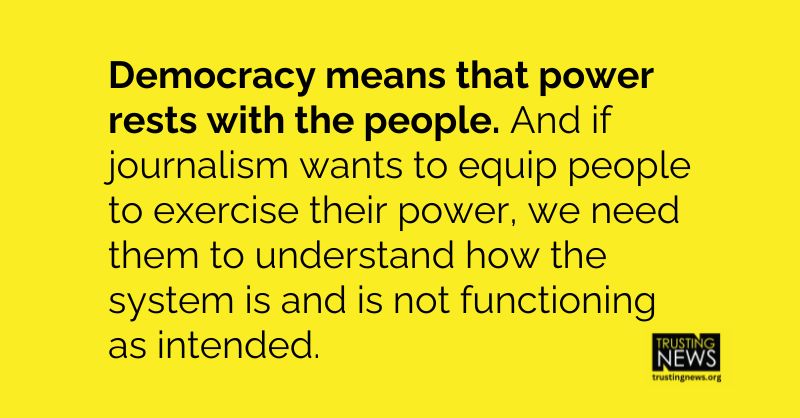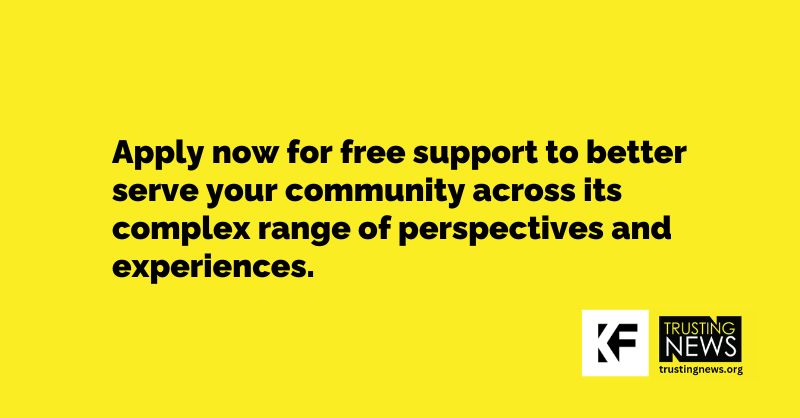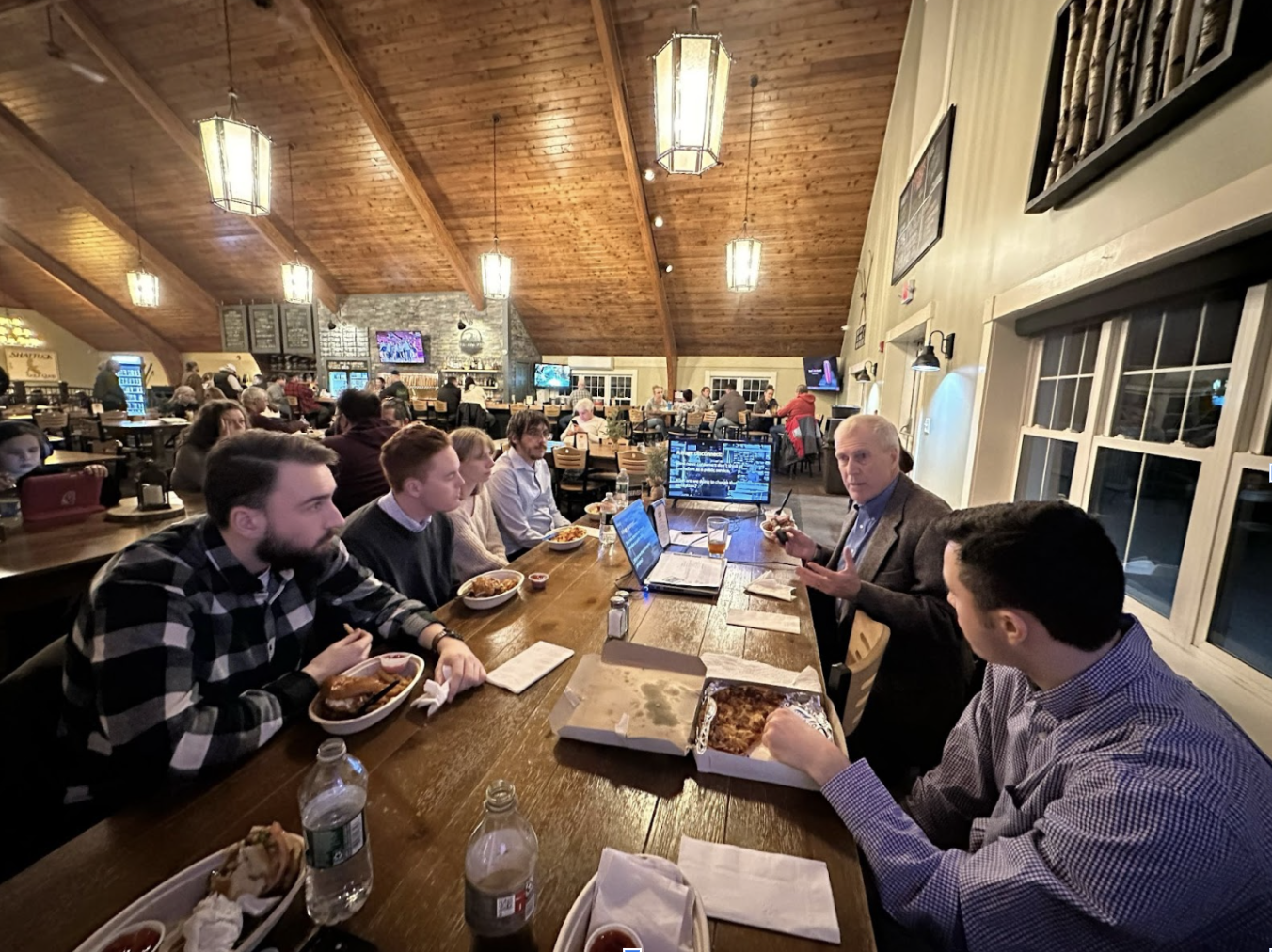
When it comes to matters of democracy — of the basic social contract we all have with our government — journalists take a lot for granted about how what we think we’re communicating will be received and understood
Connect immigration coverage to democratic principles
Want to get this Trust Tips newsletter in your inbox each Tuesday? Subscribe here.
Many people have an automatic and partisan reaction to coverage of immigration issues. They come into a story with a set of assumptions and values, and with a predetermined idea of right or wrong.
Is a story about ICE detaining a teacher an example of the rule of law at work or of a lack of due process? So many of us would have an instinctive answer. But a goal of journalism is to add context and complexity, right? So what would that look like in this case?
When it comes to matters of democracy — of the basic social contract we all have with our government — journalists take a lot for granted about how what we think we’re communicating will be received and understood. Too often, coverage doesn’t explore what elements of democracy are at play and whether they’re being held up or violated. Or it might indicate that something is unusual but not spell out exactly how.
You know what else people have a partisan reaction to? The word democracy itself. Research from PACE points to negative perceptions among some, and a recent study from Press Forward (see page 9 here) about journalism’s role in a democracy also reinforces that framing our value in terms of democracy is fraught.
Democracy means that power rests with the people. And if journalism wants to equip people to exercise their power, we need them to understand how the system is and is not functioning as intended.
A bit more context about why this matters
Journalism fulfills its public service when it is relevant to and hearable by people across our diverse, complex communities. That includes people with different views of immigration policies and practices. We want to be trusted by people across the political spectrum to point out norms and deviations in an even-handed way. That does not mean we should abandon our values or engage in false balance. It does mean we should check that *our own* lens on democratic norms is not limiting what we are noticing and reporting on.
This tension is something we’ve been hearing from several researchers we’ve been in conversation with recently. We invited one of them, Dr. Stella Rouse of Arizona State University, to join us for a conversation about immigration. You can watch the recording here.
Dr. Rouse and I talked about the elements of democracy that are most relevant to day-to-day immigration coverage. She offered important context about the rights of people in this country (not just citizens, and not just people here legally). That 15-minute part of the conversation begins here.
We then took participating journalists through an exercise I’d love to see other reporters replicate.
I’ll share three steps here in the form of questions to ask as you report. I’ll also share an example of how they apply to one of the news topics we used in our group: a Colorado teacher being detained by ICE agents after a routine immigration appointment.
Note: If you try this for yourself, please let me know how it goes and send links to any related coverage! You have no idea how happy our team is when examples land in our inboxes. Truly.
1. What democratic elements apply to this story?
Start by asking yourself what concepts might be worth unpacking in your story.
- Consult a list. There’s no one standard, but I’ve referenced this list on essential elements of democracy from the United Nations Commission on Human Rights.
- Ask your sources more questions directly about this. When I posed the question to Dr. Rouse about immigration, she had no trouble at all rattling the principles she wished were more visible in journalism.
- Ask AI. I asked ChatGPT what principles of democracy were at stake in a sample story about the Colorado teacher, and here’s what it gave me. I wouldn’t quote from it, but it’s a helpful starting point. (Read about how we use AI at Trusting News here.)
In the Colorado teacher example: The detention raised questions about due process, government accountability and equal protection under the law. Some our group flagged:
- Were the teacher’s rights protected — rights guaranteed to everyone in this country, citizen or not?
- The teacher had minor children with her. What are those children’s rights?
- On what basis was she detained? Were government decisions fair or arbitrary?
- What visibility does the public have into them?
- What process was the teacher participating in at her immigration appointment?
2. What additional information could we add?
How could news coverage of the teacher being detained more clearly articulate or examine some of those principles? One our group focused on was the system for routine immigration appointments and how law enforcement agencies engage with them.
They’d love to see journalists find answers to questions like:
- What does a routine immigration appointment usually entail?
- How many people in the country are going through a process that involves regular meetings like these?
- What are the reasons for meetings and the various visa and immigration statuses that can be involved?
- How do the meetings usually operate?
- What happens if people, afraid of getting detained, don’t attend their usual meeting?
- How do different law enforcement branches usually overlap with these meetings? What gets someone flagged?
3. Where can this information go?
Once you’ve identified a democratic principle to drill down on and what information you’d like to include, where do you put it?
It can go within or attached to a story in a lot of ways:
- Add a few extra sentences.
- Add an expert source woven throughout.
- Add a new section with a subhed.
- Add a box or sidebar.
- Add a reporter two-way.
It can also become separate content. This makes it reusable and linkable, and can be tailored to specific platforms.
- Create a separate story you can link back to explaining the process.
- Write an FAQ that walks through several of the questions listed above.
- Turn that FAQ into a social gallery to swipe through and share.
- Shoot a social video with a journalist or expert source.
- Address it as an edition of a related newsletter or episode of a podcast.
What other topics related to democracy need to be unpacked?
We asked participants what other topics they’d welcome we use this exercise on. They said things like: facism, gerrymandering, election administration, the role of public education, vilifying political opponents, the diversification of the population, and the criminal justice system. What feels helpful to you? Reply and let us know.
At Trusting News, we learn how people decide what news to trust and turn that knowledge into actionable strategies for journalists. We train and empower journalists to take responsibility for demonstrating credibility and actively earning trust through transparency and engagement. Learn more about our work, vision and team. Subscribe to our Trust Tips newsletter. Follow us on Twitter, BlueSky and LinkedIn.

Executive Director Joy Mayer (she/her) founded Trusting News in 2016 after a 20-year career in newsrooms and teaching. She lives in Sarasota, Florida, and can be reached at joy@TrustingNews.org.



